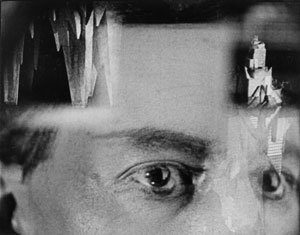Pacific Film Archive to screen French feminist’s works
![]()
| 10 September 2003
| |  A still from Germaine Dulac’s 1927 film, La Coquille et le clergyman (The Seashell and the Clergyman), screening Tuesday, Sept. 30 at the Pacific Film Archive. The film was scripted by the Surrealist Antonin Artaud. Photo courtesy of PFA |
Who was Germaine Dulac (1882-1942)? Associate curator of San Francisco Cinematheque (and Berkeley anthropology lecturer) Irina Leimbacher intends to answer that and other questions about the French filmmaker in a series of 10 films she has curated for the Pacific Film Archive, entitled “Duty, Deviance, and Desire: The Films of Germaine Dulac” (Sept. 14-30).
While Dulac didn’t believe women should be directors, she made nearly 30 films, had her own production company, founded a film journal, and wrote articles on both the theory and practice of the art form. For years now, her films have been included in programs on the history of cinema and experimental film. This month’s PFA series offers viewers the first opportunity to see a representative sampling of her varied oeuvre. The program, which includes films from archives in France and the Netherlands, will also screen at New York’s Museum of Modern Art, the UCLA Film Archives, and Cinematheque Ontario.
“Not only women directors but avant-garde and nonfiction cinema, theoretical writing about cinema, and film exhibition tend to be underplayed in most discussions of film history,” says Leimbacher. “Dulac, a woman director and a lesbian, was passionately engaged in all these aspects of cinema. At the same time, she was a successful director of commercial-length feature fiction.”
Dulac’s work ran the gamut, from groundbreaking avant-garde films during the 1920s, to commercial movies with a feminist spin, to newsreels. Her subject matter focused on the personal — marriage, adultery, and romance — from a decidedly feminist point of view. “Though her work is not explicitly lesbian,” notes Leimbacher, “it does include a critique of the heterosexual institution of marriage.”
While Dulac was incredibly varied in her approach, Leimbacher says, her films are “great fun. Some of them are over-the-top melodramas, some are morality tales, and some are the most radical avant-garde experiments of the ’20s.”
A free day-long symposium will be held on Sept. 28 in the Nesrick Room (142 Dwinelle Hall) from 11 a.m. to 5p.m., bringing together scholars of Dulac’s life and work from Yale, UCLA, the University of Wisconsin at Milwaukee, and UC Berkeley. Speakers will include Tirza Latimer, Charles Musser, B. Ruby Rich, Christophe Wall-Romana, and Tami Williams. After the symposium, English composer Neil Brand, acclaimed as one of the best improvisational silent-film accompanists, will be on hand at the PFA for the final evening of Dulac screenings.
For additional information about screenings and the symposium, please visit the PFA website: www.bampfa.berkeley.edu.

